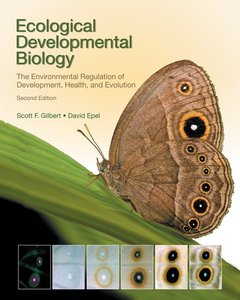Ecological Developmental Biology (2nd Ed.) The Environmental Regulation of Development, Health, and Evolution
Langue : Anglais
Auteurs : Gilbert Scott F., Epel David

Published by Sinauer Associates, an imprint of Oxford University Press. The only book that, in one place: - details the three main epigenetic sources of phenotype: symbionts, altered chromatin structure, and plasticity. - discusses the various ways that development can be disrupted: teratogens, endocrine disruptors, global climate change, and mismatches between diet and environment. - documents the evidence for an extended evolutionary synthesis involving the modern synthesis, evo-devo, and eco-evo-devo. The revolution in molecular technologies has created a revolution in our perception of the living world. It is life, but not as we knew it. * Symbiosis, once thought the exception to the rules of life, is now recognized as a signature of life, including its development and evolution. We function, develop, and possibly evolve as consortia. * Developmental plasticity has transformed our ways of relating the genome to both the organism and its environment, showing that the environment can instruct, as well as select, phenotypes. * Environmentally induced modifications of the genome (epialleles) can be created by ecological agents and inherited for many generations, showing the ability of environmental agents to generate selectable variation. * Disease susceptibilities--especially to diseases such as cancer, diabetes, asthma, autism, and obesity--may be inherited through epialleles caused by environmental agents, by mismatches in developmental plasticity, or by particular combinations of symbionts. * Global climate change and endocrine disruptors are affecting how organisms develop and how they behave. The science studying this new world, uncovering the relationships between genes, developing organisms, and their environments, is called ecological developmental biology. This book presents the data for ecological developmental biology, integrating it into new accounts of medicine, evolution, and embryology. The new evolutionary science created by this approach to nature is called ecological evolutionary developmental biology (eco-evo-devo). The book documents the evidence for a new, extended, evolutionary synthesis, a synthesis that: confounds the creationist belief that evolution can't be described above the species-level; integrates aging and "Western" diseases such as diabetes, atherosclerosis, cancer, and obesity into an evolutionary context; and sees interspecies interactions both within the organism and between organisms as being critical for evolution, development, and fitness.
Scott F. Gilbert, a Senior Research Associate at Swarthmore College and the Finland Distinguished Professor at the University of Helsinki Institute of Biotechnology, teaches developmental biology, developmental genetics, and the history of biology. After receiving his B.A. from Wesleyan University, he pursued his graduate and postdoctoral research at The Johns Hopkins University and the University of Wisconsin. Dr. Gilbert is the recipient of several awards, including the first Viktor Hamburger Award for excellence in developmental biology education, the 2004 Alexander Kowalevsky Prize for evolutionary developmental biology, honorary degrees from the Universities of Helsinki and Tartu, and the Medal of François I from the Collège de France. David Epel is the Jane and Marshall Steel Jr. Professor Emeritus of Biological Sciences at Stanford University's Hopkins Marine Station in Pacific Grove CA. He did his undergraduate studies at Wayne State University and then graduate and postdoctoral studies at the University of California, Berkeley and the University of Pennsylvania. Dr. Epel has been a Guggenheim Fellow, is a Fellow of the American Association for the Advancement of Science, the California Academy of Sciences, and an Overseas Fellow of Churchill College and Life Fellow of Clare Hall at the University of Cambridge. His honors include the Cox Medal for Fostering Undergraduate Research at Stanford and the Ed Ricketts Memorial Award for Lifetime Achievement in the Marine Sciences. Epel's research focused on cell biology of development, especially the activation of the egg at fertilization, the unique physiology of the embryo and the cellular mechanisms of embryo protection.
Date de parution : 06-2015
Ouvrage de 576 p.
25.4x20.3 cm
Thèmes d’Ecological Developmental Biology :
© 2024 LAVOISIER S.A.S.



